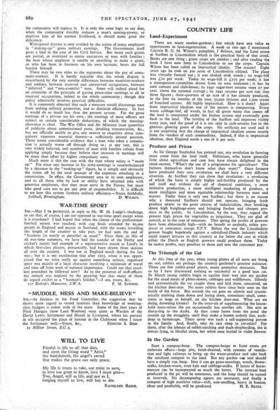COUNTRY LIFE
Land-Experiment There are many market-gardens ; few which have any value as experiments in land-regeneration. A week or two ago -I mentioned Captain IL G. M. Wilson's pamphlet, I Believe, and the Iceni estate at Surfleet in Lincolnshire which is the practical basis of that creed. Books are one thing ; green crops are another ; and after reading the book I have now been to Lincolnshire to see the crops. Captain Wilson has been called an impractical idealist. The reason? Eight years ago he took on Soo acres of Lincolnshire siltland. The place was virtually farmed out ; it was choked with weeds ; its wage-bill was £r() per week. Today its wage-bill is £175 per week; it has a management-committee drawn from its own workmen ; it has its own canteen and club-house; its 1940 sugar-beet returns were 27 per cent. above the national average ; its 1941 returns per acre run, into three figures ; three-quarters of an acre of it has already produced, in the first six months of the year, 30,000 lettuces and 1,5oo crates of bunched carrots. All highly impractical. How is it done? Apart from impractical idealism one of the secrets is composting. Every waste cabbage-leaf, all weeds, in fact all green waste that comes off the land is composted under the Indore system and eventually goes back to the land. The fertility of the Surfleet soil improves visibly every year, and the proof of it is not only in cash-returns but in the glorious glowing green of the crops. No artificials are used and it is not surprising that the charge of impractical idealism comes mostly from the vendors of such commodities. Indeed, if this is impractical idealism, then England needs a ton of it per acre.






















 Previous page
Previous page